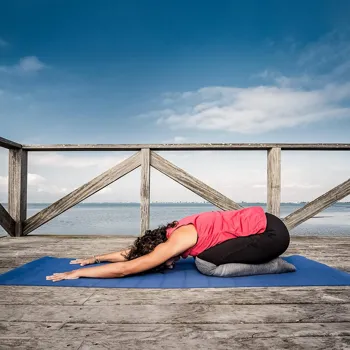Unveiling Fitness Trends: Why Yoga is the Ultimate Stress Reliever. Dive into the ancient art transforming lives!
In today's fast-paced Bharat, where deadlines loom large and traffic snarls are a daily
reality, stress has become a ubiquitous companion. We're constantly juggling work, family, social commitments, and the ever-present digital distractions.
Finding effective ways to manage this stress is crucial for maintaining our overall well-being. And amidst a plethora of fitness trends, one ancient practice stands out for its holistic approach to stress relief: Yoga. So, ditch the quick fixes and embrace the slow, steady burn of inner peace.
Yoga isn't just about flexible poses; it's a science of the mind and body, a journey towards inner calm and resilience. Let's explore why this ancient practice is gaining renewed popularity as the ultimate stress buster.
The Mind-Body Connection – It's All Interlinked, Boss!
Yoga, at its core, emphasizes the profound connection between your mind and body. Stress often manifests physically in the form of tense muscles, headaches, and digestive issues. Yoga asanas (poses) gently stretch and release these physical tensions, signaling to the brain to relax and calm down.
Think of it as a two-way street: when your body feels good, your mind automatically follows suit. Practices like mindful movement, which are embedded in yoga, encourage you to pay attention to your body's sensations, fostering a sense of awareness and grounding.
This heightened awareness helps you identify early signs of stress buildup, allowing you to address them before they escalate.
Pranayama (breath control) further enhances this mind-body connection by directly influencing the nervous system, shifting it from a state of "fight or flight" to "rest and digest."
Pranayama: Your Breath, Your Power Tool!
Pranayama, the yogic art of breath control, is a potent tool for stress management. Specific breathing techniques, like deep diaphragmatic breathing (belly breathing), stimulate the parasympathetic nervous system, responsible for relaxation and reducing heart rate and blood pressure.
Other pranayama techniques, such as alternate nostril breathing (Nadi Shodhana), help balance the two hemispheres of the brain, promoting mental clarity and emotional stability. The beauty of pranayama is its accessibility.
You can practice these techniques anytime, anywhere – during a stressful meeting, stuck in traffic, or simply before bed. Regular pranayama practice can significantly reduce anxiety and improve your overall sense of well-being.
Think of your breath as an anchor, grounding you in the present moment and calming the turbulent waters of your mind.
Asanas: More Than Just Pretty Poses, Yaar!
Yoga asanas are not just about achieving Instagram-worthy flexibility. They are designed to release physical tension, improve circulation, and stimulate internal organs.

Certain poses, like forward folds (Uttanasana) and restorative poses (Savasana), are particularly effective in calming the nervous system and reducing stress. Forward folds gently compress the abdomen, stimulating digestion and releasing tension in the back and neck.
Restorative poses, often involving the use of props like blankets and bolsters, allow your body to completely relax and surrender, promoting deep rest and rejuvenation.
Consistent asana practice builds resilience to stress by strengthening the body and improving its ability to cope with physical and emotional challenges. It's like giving your body a regular tune-up, ensuring it runs smoothly even under pressure.
Mindfulness and Meditation: Tuning Into the Present Moment
Yoga cultivates mindfulness, the ability to be fully present in the moment without judgment. In our hyper-connected world, we're often caught up in thinking about the past or worrying about the future, fueling anxiety and stress.

Yoga encourages us to bring our attention to the present, focusing on our breath, body sensations, and thoughts without getting carried away by them. Meditation, an integral part of yoga, helps to further quiet the mind and cultivate inner peace.
Regular meditation practice reduces mental chatter, improves focus, and increases self-awareness. Even a few minutes of daily meditation can have a profound impact on your stress levels. It's like hitting the "pause" button on your busy mind, allowing you to recharge and re-center yourself.
Community and Connection: Not a Solitary Journey, Buddy!
Yoga classes offer a sense of community and connection, which can be incredibly valuable for stress relief. Sharing your practice with others creates a supportive environment where you can connect with like-minded individuals, share experiences, and learn from each other.
The social interaction and sense of belonging fostered in a yoga class can combat feelings of isolation and loneliness, which often contribute to stress. Many yoga studios also offer workshops and retreats that provide opportunities for deeper learning and connection.
Remember, you're not alone in your journey to manage stress. Embracing the yoga community can provide you with the support and encouragement you need to thrive.
Improved Sleep: The Ultimate Stress Reset
Stress and sleep are intricately linked. Chronic stress can disrupt sleep patterns, leading to insomnia and fatigue. Conversely, lack of sleep can exacerbate stress. Yoga can break this vicious cycle by promoting relaxation and improving sleep quality.
Practices like restorative yoga, yoga nidra (yogic sleep), and mindful meditation can calm the nervous system, reduce racing thoughts, and prepare the body for restful sleep.
Establishing a regular yoga practice, particularly in the evening, can help regulate your sleep-wake cycle and improve your overall sleep quality. Waking up feeling refreshed and rested makes you more resilient to stress and better equipped to handle daily challenges.
Think of sleep as your body's natural reset button; yoga helps you push that button and wake up renewed.
It's Accessible to Everyone, No Excuses, Boss!
One of the most appealing aspects of yoga is its accessibility. You don't need fancy equipment or a specific level of fitness to start practicing. There are numerous styles of yoga to choose from, catering to different needs and preferences.

Whether you prefer a gentle Hatha class, a dynamic Vinyasa flow, or a restorative Yin practice, there's a style of yoga that's right for you. Online resources, including videos and apps, make it easy to practice yoga from the comfort of your own home.
Even a few minutes of daily yoga can make a significant difference in your stress levels. So, roll out your mat, take a deep breath, and embark on your journey to inner peace. Namaste!
In conclusion, yoga offers a multifaceted approach to stress relief, addressing the physical, mental, and emotional aspects of stress. Its emphasis on mind-body connection, breath control, mindful movement, and community makes it a powerful tool for managing stress and promoting overall well-being.
So, ditch the endless scrolling and embrace the ancient wisdom of yoga. Your mind and body will thank you for it. Remember, stress is inevitable, but suffering is optional. Choose yoga, choose peace. Shanti, shanti, shanti.













